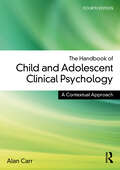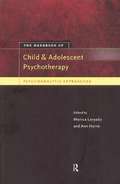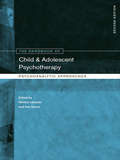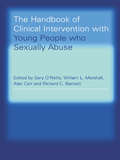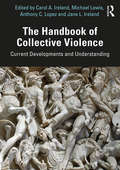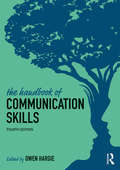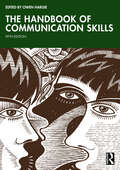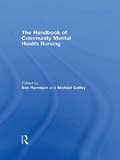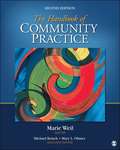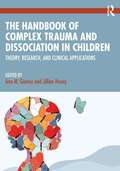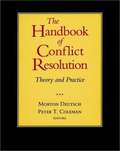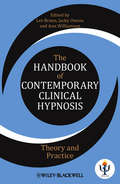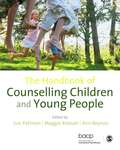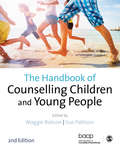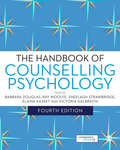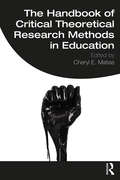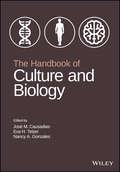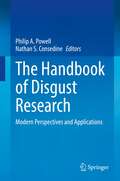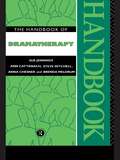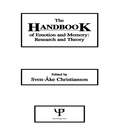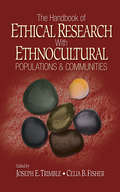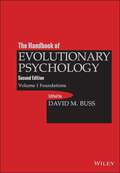- Table View
- List View
The Handbook of Child and Adolescent Clinical Psychology: A Contextual Approach
by Alan CarrNow in its fourth edition, The Handbook of Child and Adolescent Clinical Psychology incorporates important advances in the field to provide a practice- oriented and accessible resource for clinical psychologists in training.Beginning with a set of general conceptual frameworks for practice, the book gives specific guidance on the management of problems commonly encountered in clinical work with children and adolescents, drawing on the best practice in the fields of clinical psychology and family therapy. There is comprehensive coverage of Problems of infancy and early childhood Problems of middle childhood Problems of adolescence Child abuse Adjustment to major life transitions including entering foster care, parental divorce, and bereavement Each chapter dealing with specific clinical problems includes cases examples; discussion of diagnosis, classification, epidemiology, clinical features, assessment, and treatment; and practice exercises. New material includes the latest advances in child and adolescent clinical psychology assessment and treatment programmes and positive psychology. It also is updated in line with the latest revisions of ICD and DSM.This book is invaluable as both a reference work for experienced practitioners and as an up-to-date, evidence- based practice manual for clinical psychologists in training.
The Handbook of Child and Adolescent Psychotherapy: Psychoanalytic Approaches
by Ann Horne Monica LanyadoThis Handbook provides a comprehensive guide to the practice and principles of child and adolescent psychotherapy around the world.Contents include:* a brief introduction to the child psychotherapy profession, its history and development* a review of the theory underlying therapeutic practice* an overview of the varied settings in which child psychotherapists work* analysis of the growth of the profession internationally* an examination of areas of expertise around the world * a summary of current researchContributors are experienced practitioners from within a diverse range of schools and approaches and so provide a well-rounded picture of child and adolescent psychotherapy today. The Handbook of Child and Adolescent Psychotherapy will be an essential resource for professional psychotherapists, students of psychotherapy, social workers and all professionals working with disturbed children.
The Handbook of Child and Adolescent Psychotherapy: Psychoanalytic Approaches
by Monica LanyadoThis updated edition of The Handbook of Child and Adolescent Psychotherapy reflects the many changes in the profession. It includes: additional chapters on neuroscience, work with ‘looked after children’ and with foster parents, working in schools enlarged chapters on research, attachment theory, work with parents, and developments in child and adolescent psychotherapy around the world chapters on areas of specialist interest including violence, sexual abuse and abusing, trauma, parent-infant psychotherapy, autism, victims of political violence, delinquency and gender dysphoria. The Handbook remains accessible and jargon-free. It will be a valuable resource for all who work in allied professions where the emotional well-being of children is of concern – health, education, social services – as well as trainee psychotherapists and experienced practitioners.
The Handbook of Clinical Intervention with Young People who Sexually Abuse
by Alan Carr William L. Marshall Richard Beckett Gary O’ ReillyThe Handbook of Clinical Interventions with Young People who Sexually Abuse provides authoritative, critical and up-to-date reviews of the growing body of empirical and theoretical knowledge in this field and clearly demonstrates how this knowledge can be used to guide and develop evidence-based practice for assessment and treatment. Key features include:* essentials of effective treatment programmes* relapse prevention* adolescents with intellectual disabilities and female offenders* work with families of young people who sexually abuse. Practical guidelines from acknowledged international experts with extensive experience of research and clinical practice will be invaluable to all those working with young people who engage in sexually abusive behaviour.
The Handbook of Collective Violence: Current Developments and Understanding
by Michael Lewis Carol A. Ireland Jane L. Ireland Anthony LopezThe first of its kind, The Handbook of Collective Violence covers a range of contexts in which collective violence occurs, bringing together international perspectives from psychology, criminology and sociology into one complete volume. There have been significant advances made in the last 25 years regarding how collective violence is conceptualised and understood, with a move away from focusing on solely individual forms of violence toward examining and understanding violence that can occur within groups. This handbook presents some of the most interesting topics within the area of collective violence, drawing upon international expertise and including some of the most well-known academics and practitioners of our generation. Structured into four parts: understanding war; terrorism; public order and organized violent crime; and gang and multiple offender groups, this volume provides academics and practitioners with an up-to-date resource that covers core areas of interest and application. Accessibly written, it is ideal for both academics and policymakers alike, capturing developments in the field and offering a deep theoretical insight to enhance our understanding of how such collective violence evolves, alongside practical suggestions for management, prevention and intervention.
The Handbook of Communication Skills
by Owen HargieThe Handbook of Communication Skills is recognised as one of the core texts in the field of communication, offering a state-of-the-art overview of this rapidly evolving field of study. This comprehensively revised and updated fourth edition arrives at a time when the realm of interpersonal communication has attracted immense attention. Recent research showing the potency of communication skills for success in many walks of life has stimulated considerable interest in this area, both from academic researchers, and from practitioners whose day-to-day work is so dependent on effective social skills. Covering topics such as non-verbal behaviour, listening, negotiation and persuasion, the book situates communication in a range of different contexts, from interacting in groups to the counselling interview. Based on the core tenet that interpersonal communication can be conceptualised as a form of skilled activity, and including new chapters on cognitive behavioural therapy and coaching and mentoring, this new edition also places communication in context with advances in digital technology. The Handbook of Communication Skills represents the most significant single contribution to the literature in this domain. Providing a rich mine of information for the neophyte and practising professional, it is perfect for use in a variety of contexts, from theoretical mainstream communication modules on degree programmes to vocational courses in health, business and education. With contributions from an internationally renowned range of scholars, this is the definitive text for students, researchers and professionals alike.
The Handbook of Communication Skills
by Owen HargieThe Handbook of Communication Skills is recognised as one of the core texts in the field of communication, offering a state-of-the-art overview of this rapidly evolving field of study.The fifth edition of this bestselling book situates communication in a range of different contexts, from interacting in groups to the counselling interview. It covers topics such as non-verbal behaviour, listening, negotiation, interacting in groups and mentoring. This new edition has been fully revised and updated and includes a brand new chapter on digitally mediated communications in social and working environments, as well as newly written chapters on humour and laughter in communication, and persuasion. Based on the core tenet that interpersonal communication can be conceptualised as a form of skilled activity, the book looks at core communication skills and how these can be applied in specific contexts, expertly combining theory with practice.This handbook provides a rich mine of information for use in a variety of contexts, from theoretical mainstream communication modules on degree programmes to vocational courses in health, business and education. With contributions from an internationally renowned range of scholars, this is the definitive text for students, researchers and professionals alike.
The Handbook of Community Mental Health Nursing
by Michael Coffey Ben HanniganThis handbook brings together authoritative contributions from leading mental health researchers, educators and practitioners to provide a comprehensive text for community mental health nurses in training and practice. In thirty-three chapters it covers a wide range of topics, from the history of the profession to current approaches to specific client groups, organised around three linked themes: professional context practice issues education and research. Each chapter includes a summary of key points and suggestions for further reading, and also includes useful appendices listing key professional and voluntary organisations, journals, Internet and mailing lists.The handbook reflects the diversity and scope of the role of the CMHN and recognizes the multidisciplinary and service user context in which nurses work. It is an essential text for CMHNs and mental health nurse educators, and offers a useful source of reference for allied professionals.
The Handbook of Community Practice
by Marie Weil Mary L. Ohmer Michael ReischThe Second Edition of The Handbook of Community Practice is expanded and updated with a major global focus and serves as a comprehensive guidebook of community practice grounded in social justice and human rights. It utilizes community and practice theories and encompasses community development, organizing, planning, social change, policy practice, program development, service coordination, organizational cultural competency, and community-based research in relation to global poverty and community empowerment. This is also the first community practice text to provide combined and in-depth treatment of globalization and international development practice issues--including impacts on communities in the United States and on international development work. The Handbook is grounded in participatory and empowerment practices, including social change, social and economic development, feminist practice, community-collaborative, and engagement in diverse communities. It utilizes the social development perspective and employs analyses of persistent poverty, asset development, policy practice, and community research approaches as well as providing strategies for advocacy and social and legislative action. The handbook consists of forty chapters which challenge readers to examine and assess practice, theory, and research methods. As it expands on models and approaches, delineates emerging issues, and connects policy and practice, the book provides vision and strategies for local to global community practice in the coming decades. The handbook will continue to stand as the central text and reference for comprehensive community practice, and will be useful for years to come as it emphasizes direction for positive change, new developments in community approaches, and focuses attention on globalization, human rights, and social justice. It will continue to be used as a core text for multiple courses within programs, will have long term application for students of community practice, and will provide practitioners with new grounding for development, planning, organizing, and empowerment and social change work.
The Handbook of Complex Trauma and Dissociation in Children: Theory, Research, and Clinical Applications
by Ana M. Gómez Jillian HoseyThe Handbook of Complex Trauma and Dissociation in Children: Theory, Research, and Clinical Applications is a comprehensive and truly vital text for both experienced professionals and novice clinicians alike. In these pages, dozens of experts and pioneers thoroughly cover the complex nuances of theory, assessment, research, and clinical practice. Specific sections cover etiology, neurobiology, and various theoretical and conceptual models for working with the complexities of cumulative and chronic traumatization in childhood.Additional sections cover standardized and non-standardized assessment and diagnostic tools, as well as the formulation and organization of the clinical interview with children and caregivers. Other chapters provide systematic and comprehensive reviews of current treatment modalities and effective approaches for treating children with complex trauma and dissociation across different stages of early development. The book’s co-editors bookend the volume with thorough explorations of the nuanced and multifaceted issues impacting children with complex trauma and dissociative symptoms and features.
The Handbook of Conflict Resolution
by Peter T. ColemanCreated under the direction of Morton Deutsch, a founder of the field of conflict resolution, The Handbook of Conflict Resolution is a compendium of knowledge from a stellar panel of experts.
The Handbook of Contemporary Clinical Hypnosis
by Les Brann Ann Williamson Jacky OwensCovering theory and practice, The Handbook of Contemporary Clinical Hypnosis is an up-to-date, authoritative resource to support health professionals in their use of hypnosis in clinical settings. Provides an authoritative new reference for practitioners and trainees on the diverse applications of hypnosis, published under the auspices of the British Society for Clinical and Academic Hypnosis (BSCAH)Combines a theoretical framework with material on a wide range of specific disorders including anxiety, stress phobias, eczema, oncology, eating disorders and infertilityShows how to adjust hypnotic techniques for different contexts e.g. when working with children, in emergencies and via a translator Features a variety of case studies that illustrate hypnosis techniques in action
The Handbook of Counselling Children & Young People
by Sue Pattison Ann Beynon Maggie RobsonThis landmark handbook brings together the fundamentals of counselling children and young people theory, research, skills and practice. It addresses what every successful trainee or practitioner needs to know in a way that is comprehensive, accessible and jargon-free. Divided into four parts, it covers: theory and practice approaches, including chapters on child development, person-centred, psychodynamic, CBT, Gestalt approaches, and more counselling process, including chapters on the therapeutic relationship, skills, groupwork, supervision practice issues, including chapters on law and policy, ethics, diversity, challenging behaviour practice settings, including chapters on health and social care settings, school and education, multi-agency and collaboration. Each chapter includes a chapter introduction and summary, reflective questions and activities, helping trainees to cement their learning. With chapters contributed by leading experts and academics in the field, this book is essential reading for trainees and practitioners working with children and young people.
The Handbook of Counselling Children & Young People
by Sue Pattison Ann Beynon Maggie RobsonThis landmark handbook brings together the fundamentals of counselling children and young people theory, research, skills and practice. It addresses what every successful trainee or practitioner needs to know in a way that is comprehensive, accessible and jargon-free. Divided into four parts, it covers: theory and practice approaches, including chapters on child development, person-centred, psychodynamic, CBT, Gestalt approaches, and more counselling process, including chapters on the therapeutic relationship, skills, groupwork, supervision practice issues, including chapters on law and policy, ethics, diversity, challenging behaviour practice settings, including chapters on health and social care settings, school and education, multi-agency and collaboration. Each chapter includes a chapter introduction and summary, reflective questions and activities, helping trainees to cement their learning. With chapters contributed by leading experts and academics in the field, this book is essential reading for trainees and practitioners working with children and young people.
The Handbook of Counselling Children & Young People
by Sue Pattison Maggie RobsonExpert authors from a wide range of backgrounds bring together the fundamentals of counselling practice with children and young people in this landmark handbook. It covers all your students need to know about theory and practice approaches, the counselling process, and practice issues and settings. This second edition is updated with the latest developments and research in an ever-changing field, and includes new content on: Diversity and difference Mental illness Safeguarding and risk assessment Child and young people's development Attachment theory and application Each chapter includes a chapter introduction and summary, reflective questions and activities, helping trainees to cement their learning. With chapters contributed by leading specialists and academics in the field, this book is essential reading for trainees and practitioners working with children and young people.
The Handbook of Counselling Children & Young People
by Sue Pattison Maggie RobsonExpert authors from a wide range of backgrounds bring together the fundamentals of counselling practice with children and young people in this landmark handbook. It covers all your students need to know about theory and practice approaches, the counselling process, and practice issues and settings. This second edition is updated with the latest developments and research in an ever-changing field, and includes new content on: Diversity and difference Mental illness Safeguarding and risk assessment Child and young people's development Attachment theory and application Each chapter includes a chapter introduction and summary, reflective questions and activities, helping trainees to cement their learning. With chapters contributed by leading specialists and academics in the field, this book is essential reading for trainees and practitioners working with children and young people.
The Handbook of Counselling Psychology
by Barbara Douglas Ray Woolfe Elaine Kasket Sheelagh Strawbridge Victoria GalbraithThis fourth edition provides the most comprehensive guide to the field of counselling psychology, exploring a range of theories and philosophical underpinnings, practice approaches and contexts, and professional issues. It has been updated to reflect current issues and debates and to map onto the training standards, and offers the ultimate companion for your journey through counselling psychology training and into the workplace. New to the fourth edition: Chapters on: Person-Centred Therapy; Mindfulness; Neuroscience; Engaging with and Carrying out Research; Reflective Practice; International Dimensions; and Ecopsychology A companion website offering hours of video and audio, including conversations with counselling psychology practitioners and trainees, and articles, exercises and case studies Other new features include: Further Reading, ‘Day in the Life of’ dialogues with practitioners; Reflective Exercises, and Discussion Points, and new case studies. Special attention has been paid to the topic of research, both as a theme throughout the book, and through four new chapters covering the use, carry out and publication of research at different stages of training and practice. The handbook is the essential textbook for students and practitioners in the field of counselling psychology and allied health professions, at all stages of their career and across a range of settings, both in the UK and internationally.
The Handbook of Counselling Psychology
by Barbara Douglas Ray Woolfe Elaine Kasket Sheelagh Strawbridge Victoria GalbraithThis fourth edition provides the most comprehensive guide to the field of counselling psychology, exploring a range of theories and philosophical underpinnings, practice approaches and contexts, and professional issues. It has been updated to reflect current issues and debates and to map onto the training standards, and offers the ultimate companion for your journey through counselling psychology training and into the workplace. New to the fourth edition: Chapters on: Person-Centred Therapy; Mindfulness; Neuroscience; Engaging with and Carrying out Research; Reflective Practice; International Dimensions; and Ecopsychology A companion website offering hours of video and audio, including conversations with counselling psychology practitioners and trainees, and articles, exercises and case studies Other new features include: Further Reading, ‘Day in the Life of’ dialogues with practitioners; Reflective Exercises, and Discussion Points, and new case studies. Special attention has been paid to the topic of research, both as a theme throughout the book, and through four new chapters covering the use, carry out and publication of research at different stages of training and practice. The handbook is the essential textbook for students and practitioners in the field of counselling psychology and allied health professions, at all stages of their career and across a range of settings, both in the UK and internationally.
The Handbook of Critical Theoretical Research Methods in Education
by Cheryl E. MatiasThe Handbook of Critical Theoretical Research Methods in Education approaches theory as a method for doing research, rather than as a background framework. Educational research often reduces theory to a framework used only to analyze empirically collected data. In this view theories are not considered methods, and studies that apply them as such are not given credence. This misunderstanding is primarily due to an empiricist stance of educational research, one that lacks understanding of how theories operate methodologically and presumes positivism is the only valid form of research. This limited perspective has serious consequences on essential academic activities: publication, tenure and promotion, grants, and academic awards. Expanding what constitutes methods in critical theoretical educational research, this edited book details 21 educationally just theories and demonstrates how theories are applied as method to various subfields in education. From critical race hermeneutics to Bakhtin’s dialogism, each chapter explicates the ideological roots of said theory while teaching us how to apply the theory as method. This edited book is the first of its kind in educational research. To date, no other book details educationally just theories and clearly explicates how those theories can be applied as methods. With contributions from scholars in the fields of education and qualitative research worldwide, the book will appeal to researchers and graduate students.
The Handbook of Culture and Biology
by José M. Causadias Eva H. Telzer Nancy A. GonzalesA comprehensive guide to empirical and theoretical research advances in culture and biology interplay Culture and biology are considered as two domains of equal importance and constant coevolution, although they have traditionally been studied in isolation. The Handbook of Culture and Biology is a comprehensive resource that focuses on theory and research in culture and biology interplay. This emerging field centers on how these two processes have evolved together, how culture, biology, and environment influence each other, and how they shape behavior, cognition, and development among humans and animals across multiple levels, types, timeframes, and domains of analysis. The text provides an overview of current empirical and theoretical advances in culture and biology interplay research through the work of some of the most influential scholars in the field. Harnessing insights from a range of disciplines (e.g., biology, neuroscience, primatology, psychology) and research methods (experiments, genetic epidemiology, naturalistic observations, neuroimaging), it explores diverse topics including animal culture, cultural genomics, and neurobiology of cultural experiences. The authors also advance the field by discussing key challenges and limitations in current research. The Handbook of Culture and Biology is an important resource that: Gathers related research areas into the single, cohesive field of culture and biology interplay Offers a unique and comprehensive collection from leading and influential scholars Contains information from a wide range of disciplines and research methods Introduces well-validated and coherently articulated conceptual frameworks Written for scholars in the field, this handbook brings together related areas of research and theory that have traditionally been disjointed into the single, cohesive field of culture and biology interplay.
The Handbook of Disgust Research: Modern Perspectives and Applications
by Philip A. Powell Nathan S. ConsedineThis volume brings together the world's leading experts on disgust to fully explore this understudied behavior. Disgust is unique among emotions. It is, at once, perhaps the most “basic” and visceral of feelings while also being profoundly shaped by learning and culture. Evident from the earliest months of life, disgust influences individual behavior and shapes societies across political, social, economic, legal, ecological, and health contexts. As an emotion that evolved to prevent our eating contaminated foods, disgust is now known to motivate wider behaviors, social processes, and customs. On a global scale, disgust finds a place in population health initiatives, from hand hygiene to tobacco warning labels, and may underlie aversions to globalization and other progressive agendas, such as those regarding sustainable consumption and gay marriage.This comprehensive work provides cutting‐edge, timely, and succinct theoretical and empirical contributions illustrating the breadth, rigor, relevance, and increasing maturity of disgust research to modern life. It is relevant to a wide range of psychological research and is particularly important to behavior viewed through an evolutionary lens, As such, it will stimulate further research and clinical applications that allow for a broader conceptualization of human behavior.The reader will find:Succinct and accessible summaries of key perspectivesHighlights of new scientific developmentsA rich blend of theoretical and empirical chapters
The Handbook of Dramatherapy
by Steve Mitchell Sue Jennings Anna Chesner Ann Cattanach Brenda Meldrum Steve Mitchell NfaDramatherapy is being increasingly practised in a range of therapeutic settings and is of growing interest to theatre practitioners and teachers. The Handbook of Dramatherapy brings together five authors who have considerable experience of clinical, artistic and educational work to provide an easy-to-read introduction to the major models of dramatherapy. The authors explain the differences between dramatherapy and psychodrama, discuss its relationship with theatre art, look at assessment and evaluation techniques, and argue the need for more appropriate methods of research for this increasingly popular form of therapeutic treatment.The Handbook of Dramatherapy provides a comprehensive basis for theory and practice and will be an invaluable resource for all students of dramatherapy and theatre.
The Handbook of Emotion and Memory: Research and Theory
by Sven-This important volume defines the state of the art in the field of emotion and memory by offering a blend of research review, unpublished findings, and theory on topics related to its study. As the first contemporary reference source in this area, it summarizes findings on implicit and explicit aspects of emotion and memory, addresses conceptual and methodological difficulties associated with different paradigms and current procedures, and presents broad theoretical perspectives to guide further research. This volume articulates the accomplishments of the field and the points of disagreement, and gives the brain, clinical, and cognitive sciences an invaluable resource for 21st-century researchers. Citing and analyzing the results of experiments as well as field and case studies, the chapters are organized around methodological approaches, biological-evolutionary perspectives, and clinical perspectives, and bring together experts in neuroscience, and both cognitive and clinical psychology. Questions addressed include: * What is the nature of emotional events and what do we retain from them? * Is there something about emotional events that causes them to be processed differently in memory? * Do emotional memories have special characteristics that differ from those produced by "ordinary" memory mechanisms or systems? * Do people with emotional disturbances remember differently than normal people? * Which factors play the most crucial role in functional amnesia?
The Handbook of Ethical Research with Ethnocultural Populations and Communities
by Joseph E. Trimble Dr Celia B. FisherThe Handbook of Ethical Research With Ethnocultural Populations and Communities, edited by Joseph E. Trimble and Celia B. Fisher, addressES key questions in the first major work to focus specifically on ethical issues involving work with ethnocultural populations. Filling gaps and questions left unanswered by general rules of scientific conduct such as those embodied in federal regulations and professional codes, this Handbook will help guide ethical decision making for social and behavioral science research with multicultural groups for years to come.
The Handbook of Evolutionary Psychology, Volume 1: Foundation
by David M. BussThe indispensable reference tool for the groundbreaking science of evolutionary psychology Why is the mind designed the way it is? How does input from the environment interact with the mind to produce behavior? These are the big, unanswered questions that the field of evolutionary psychology seeks to explore. The Handbook of Evolutionary Psychology is the seminal work in this vibrant, quickly-developing new discipline. In this thorough revision and expansion, luminaries in the field provide an in-depth exploration of the foundations of evolutionary psychology and explain the new empirical discoveries and theoretical developments that continue at a breathtaking pace. Evolutionary psychologists posit that the mind has a specialized and complex structure, just as the body has a specialized and complex structure. From this important theoretical concept arises the vast array of possibilities that are at the core of the field, which seeks to examine such traits as perception, language, and memory from an evolutionary perspective. This examination is intended to determine the human psychological traits that are the products of sexual and natural selection and, as such, to chart and understand human nature. Join the discussion of the big questions addressed by the burgeoning field of evolutionary psychology Explore the foundations of evolutionary psychology, from theory and methods to the thoughts of EP critics Discover the psychology of human survival, mating, parenting, cooperation and conflict, culture, and more Identify how evolutionary psychology is interwoven with other academic subjects and traditional psychological disciplines The Handbook of Evolutionary Psychology is the definitive guide for every psychologist and student interested in keeping abreast of new ideas in this quickly-developing field.
